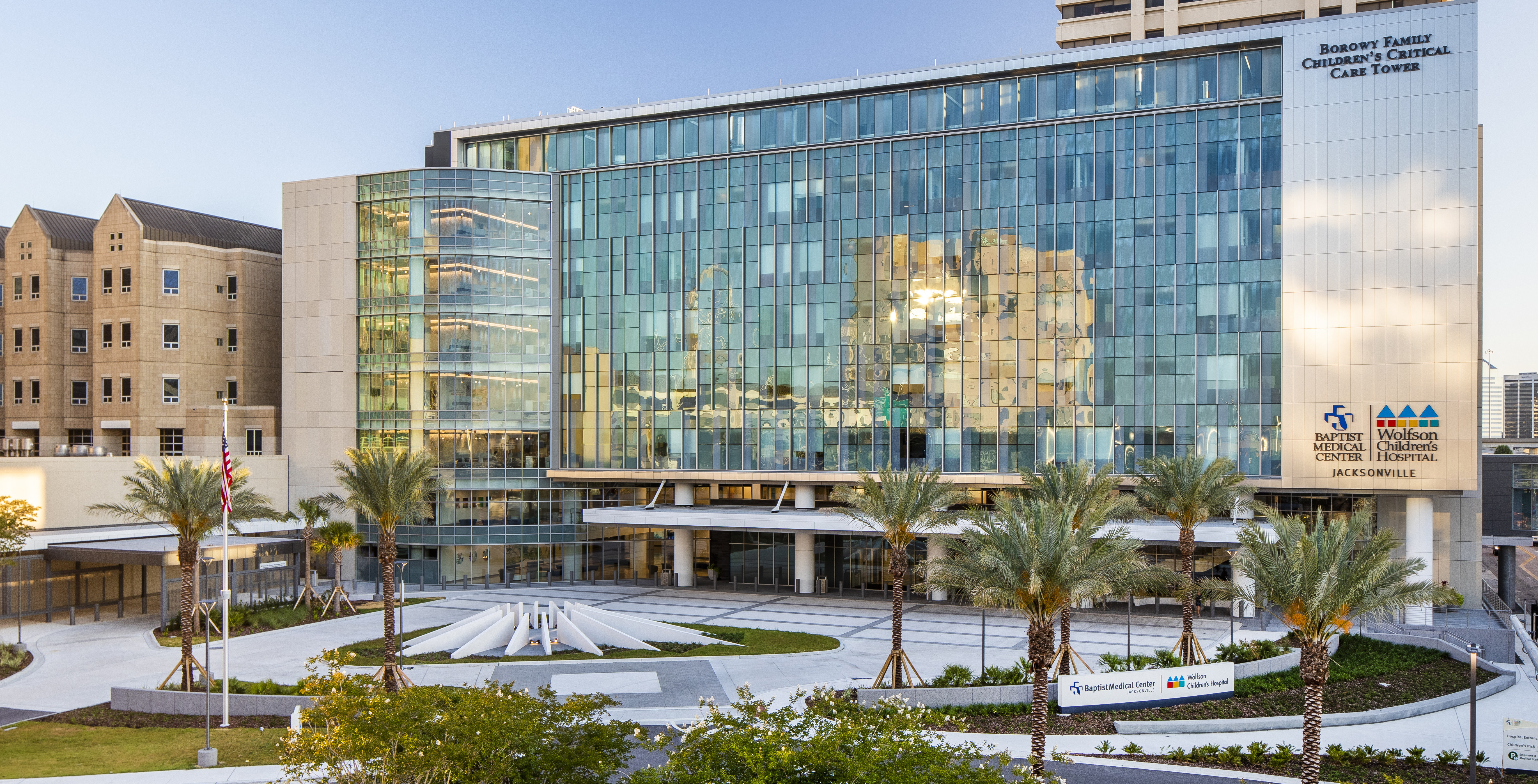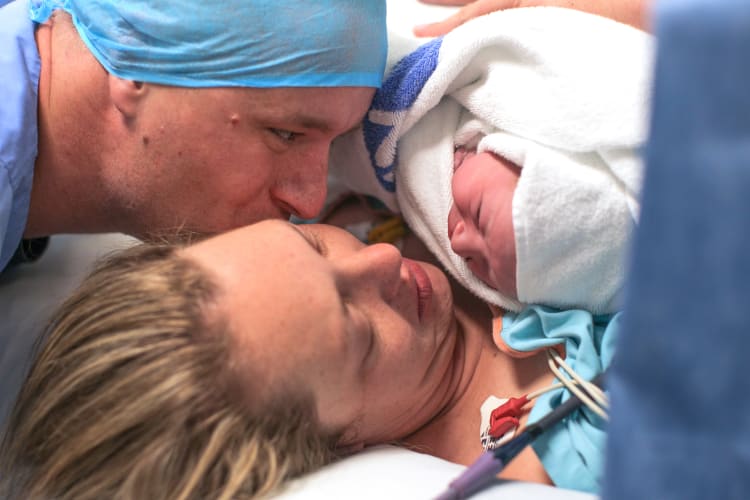Melanie Cole: Welcome to Baptist Health Radio with Baptist Health of Northeast Florida. As the most preferred healthcare provider in Northeast Florida, we're here to help you stay informed with the latest news, views and resources for your health and wellbeing. I'm Melanie Cole, and I invite you to join us as we talk about pregnancy complications, risks and management from a maternal-fetal medicine specialist.
Joining me is Dr. Kathryn Villano. She's the Chief of Perinatal Services at Baptist Health and Wolfson Children's Hospital. Dr. Villano, it's a pleasure to have you with us today. And we were talking a little bit about off the air because I did have a high-risk pregnancy a long time ago, but I'd like you to tell the listeners what constitutes a high-risk pregnancy.
Dr. Kathryn Villano: Thank you for having me, Melanie. So there are a couple of different aspects of a pregnancy that might make you high risk. The first most common reason to be considered a high-risk pregnancy has to do with maternal factors, whether the mom has underlying medical issues, of what we call advanced maternal age, which is a nice way for saying you're over 35 with your pregnancy. The second reason to be considered a high-risk pregnancy may have to do with the baby, because we really have two patients when we're taking care of a pregnancy. We're taking care of the mom and then we're also taking care of her baby. And so sometimes the baby may have risk factors as well, whether that's issues with growth in utero, issues with certain types of birth defects or risk factors for genetic problems. So really, we handle two different types of high-risk patients. Some patients have one problem or the other, some patients have both.
Melanie Cole: That's an excellent definition. I love how you say you have two patients. So why don't you tell us a little bit about yourself? What is a maternal-fetal medicine specialist? What's your role in a high-risk pregnancy?
Dr. Kathryn Villano: A maternal-fetal medicine specialist is what probably most people know as a high-risk OB. We are OB-GYN physicians who do additional training specific to maternal physiology and fetal complications in pregnancy. We help primary care OB-GYNs handle patients with risks, medical conditions, problems for the baby so that the patient and her baby get the best care possible.
Melanie Cole: So I'd like you to expand just a bit, Dr. Villano, on common reasons that a pregnancy is considered high risk. How is this identified and what conditions do you look to with a mother that might determine that this is high risk?
Dr. Kathryn Villano: So, some conditions are present even before we get pregnant. Those are things like morbid obesity, other medical problems, such as chronic hypertension; underlying diabetes, as we have a population that is developing diabetes at younger, earlier ages all the time; whether or not a mom might have an underlying chronic heart condition, lung disease, gastrointestinal disease like Crohn's disease. As our moms are getting older in pregnancy, they often have cancer diagnoses even that happen before pregnancy, whether it's breast cancer, thyroid cancer, sometimes leukemia, lymphomas. Those types of medical histories put you at higher risk in pregnancy. So, for that reason, we might see those patients either before they get pregnant to try and optimize how well controlled their medical problems are before we get a baby on board or we might be helping to manage those medical problems during a pregnancy, because pregnancy itself changes a lot of the way our body works. It changes the way our blood pressure behaves. It changes our responses to certain medications. Some medications we can't use in pregnancy because it's not safe for the baby. So there's a lot that needs to be considered when a mom has underlying medical conditions, preferably even before she gets pregnant, but certainly during the pregnancy.
In other cases, we have medical conditions that arise because of the pregnancy. So, for example, gestational diabetes. The placenta, the portion of the pregnancy that allows blood flow and oxygen and nutrition exchange between mom and baby, that placenta makes hormones. And those hormones interfere with our body's natural blood sugar metabolism. They interfere with our insulin. So some patients who are normally perfectly healthy people will develop temporary diabetes while they're pregnant, due to those hormone fluctuations. And that can have impacts on baby because whatever mom's blood sugar is, the baby's blood sugar is. And that can cause changes in baby's metabolism, put baby at risk for other complications. So, that's a good example of a medical problem that arises because of the pregnancy, does have an impact primarily on baby, has some long-term impacts for mom as well. Those are things that sometimes we can't predict and they pop up, so you may need to see a high-risk doctor if those types of problems arise.
And then lastly, if you have a history of complications in pregnancy, whether that's high blood pressure complications, a history of a child that was born previously with a medical condition or a birth defect, you may need to see a high-risk doctor to evaluate the next pregnancy in more detail, follow that pregnancy as far as baby's growth and development are concerned and make sure that we minimize risk factors for recurrence of those types of complications.
Melanie Cole: I'm so glad you mentioned that because I imagine many women want to know if they had one high-risk pregnancy, does it necessarily follow that their next one would be as well? Dr. Villano, what are some important questions that can help a woman guide the conversation with her OB-GYN when they're considering pregnancy, whether it's her first or her second or third, especially if they had been considered high risk previously.
Dr. Kathryn Villano: The best conversation to have with your OB first and foremost is are you planning on having kids in the future and when would you like that to happen, so that your OB can help you with contraceptive options, planning ahead. All of those things help tremendously, as far as minimizing the risks for high-risk pregnancy.
Every woman who's considering being pregnant should be taking certain vitamins to minimize the risk of birth defects. We have found that supplementing folic acid reduces the risk of spina bifida, a birth defect involving the spine and the spinal cord. Having that conversation with your OB in advance gives you the time to get everything lined up the way you need it to be. If you're considering a pregnancy, ideally, we want you on those vitamins three months prior. Everyone who's considering a pregnancy should have a conversation with their OB-GYN ahead of time.
Secondly, if you do think you have risk factors for a high-risk pregnancy, it's a great conversation to have with your OB about, "How might this impact my pregnancy? And can we look at my medications? Are these medications, all things that would be safe for me to be on if I were to get pregnant?" That's a common issue that comes up particularly with our moms who maybe didn't expect to be pregnant as early as they are, and they are on medicines that we need to transition them off of. So, looking at, for example, your high blood pressure medicine and deciding, "Is this one the best option for me when I'm pregnant? And if not, maybe we go ahead and make a change to that medicine now before I'm pregnant, make sure my blood pressure is really well controlled on it, get the right dose, get on a stable regimen and then get baby on board."
So those types of conversations about your medicines, what your personal medical problems are, how that might impact pregnancy are great ones to have at your annual exam or even a specific visit to talk to your OB about pregnancy planning. I think most patients really enjoy that because they have much less uncertainty. They get a chance to ask all of their questions, get those answered. Make sure that we've gotten everything in place and have that mom as healthy as she can be before she gets baby on board. So that she really has a comfort going into that pregnancy that everything's covered, we've got a plan and we know what the next steps are going to be.
Melanie Cole: What a great educator you are. And thank you for telling us those ways that a woman can really discuss with her OB-GYN and possibly prevent pregnancy complications before they even begin. As we wrap up, why is it important to deliver at a maternity hospital with a high-level neonatal intensive care unit? Can you tell us a little bit about the new neonatal intensive care unit in the Borowy Family Children's Critical Care Tower at Wolfson Children's Hospital?
Dr. Kathryn Villano: At Baptist Medical Center in Jacksonville, we are really blessed to have a huge team of support for our moms who are experiencing high-risk pregnancy. Not only do we have all the medical specialists, high-risk obstetricians, maternal-fetal medicine physicians, and high-risk anesthesiology services that a mom with medical problems might need, but we also have all of the resources of Wolfson Children's Hospital right at our doorstep.
And what we do in our program is, ideally identify our babies at risk for complications in the newborn period. We allow the mom to have visits with the care team, with the pediatric specialist that'll be taking care of her baby, even before the baby's born. They get to know that baby, they get looped in on all of the ultrasounds that we're doing, how baby's progressing in the womb. They'll be aware of when that baby is being born, whether mom goes into labor or when we plan a delivery. They're all part of that planning process.
Our new NICU is amazing. We've always had the capability of taking care of our youngest babies all the way down to 23 weeks gestation. But now we have a beautiful unit to provide that care with all of the most state-of-the-art equipment as far as patient education and communication. It's really a beautiful facility, and I think it's going to be a huge blessing to our community to have that type of care and space and warm environment for our families with babies that need our special care.
Melanie Cole: Thank you so much, Dr. Villano, for joining us today and really sharing your incredible expertise for couples and expectant parents, because high-risk pregnancies can be very scary, but boy, you've sure answered a lot of questions today. Thank you so much.
And to find out more about pregnancy and wellness resources at Baptist Health, please call 904-202-4HER, that's 4437.
Thank you so much for listening to Baptist Health Radio. As the most preferred healthcare provider in Northeast Florida, we're here to help you stay informed with the latest news, views and resources for your health and wellbeing. I'm Melanie Cole.








